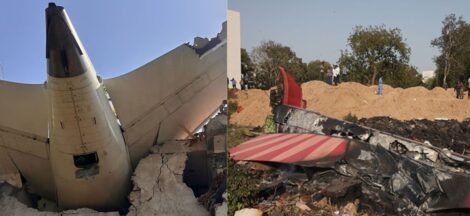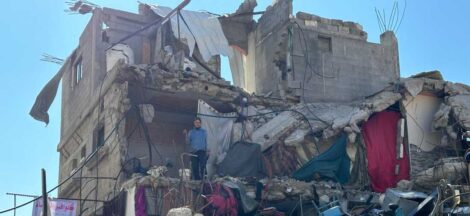Abdallah Maki Mosleh al-Rifai, known as Abu Khadija, the leader of the Islamic State in Iraq and Syria, was killed in a coordinated operation by Iraqi national intelligence and U.S.-led coalition forces. The operation, involving an airstrike in Iraq’s Anbar province, was confirmed by Iraqi Prime Minister Mohammed Shia al-Sudani and U.S. President Donald Trump.
Al-Rifai, described by al-Sudani as “one of the most dangerous terrorists in Iraq and the world,” was targeted due to his significant role in ISIS operations. The airstrike not only eliminated al-Rifai but also another ISIS member, both of whom were found with suicide vests and multiple weapons.
President Trump, addressing the nation, stated, “Today the fugitive leader of ISIS in Iraq was killed. He was relentlessly hunted down by our intrepid warfighters.” He further commented that al-Rifai’s “miserable life was terminated,” underscoring the commitment of U.S. forces in combating terrorism.
The U.S. Central Command identified al-Rifai as the “Global #2 leader of ISIS, Chief of Global Operations, and Emir of the Delegated Committee.” General Michael Erik Kurilla of CENTCOM emphasized the significance of the operation, stating that they would continue to “eliminate terrorists and dismantle their organizations.”
This operation coincided with a visit to Iraq by Syria’s top diplomat, during which both nations pledged to enhance cooperative efforts against ISIS. The collaboration between Iraqi, U.S., and Kurdish forces highlights the ongoing international commitment to countering ISIS and ensuring regional stability.
The elimination of al-Rifai is a significant blow to ISIS, disrupting its leadership and operational capabilities. It also serves as a testament to the effectiveness of joint operations and intelligence sharing among allied forces in the fight against global terrorism.
As the U.S. and Iraq prepare for the scheduled withdrawal of U.S. forces by September 2025, concerns about the remaining ISIS threat persist. However, operations like the one that led to al-Rifai’s death demonstrate the continued vigilance and proactive measures being taken to prevent any resurgence of the group.
The international community has widely praised the operation, viewing it as a critical step toward dismantling ISIS’s network and preventing future terrorist activities. The collaborative efforts of Iraqi, U.S., and Kurdish forces underscore the importance of unity in addressing global security challenges.
While the death of al-Rifai marks a pivotal moment in the fight against ISIS, authorities remain cautious, acknowledging that the ideology persists and that continued efforts are necessary to combat extremism. The operation serves as both a victory and a reminder of the ongoing commitment required to ensure lasting peace and security in the region.
The release of footage from the operation by the White House has provided transparency and insight into the mission’s execution, further solidifying public support for the measures taken against ISIS leadership. This move aligns with the administration’s efforts to keep the public informed about national security initiatives.
In the broader context, the elimination of high-profile terrorist leaders like al-Rifai serves as a deterrent to extremist activities and sends a clear message about the international community’s resolve to combat terrorism. It also highlights the critical role of intelligence and military cooperation in achieving strategic objectives.
As the region continues to navigate complex security dynamics, the success of such operations reinforces the importance of sustained collaboration among nations to address the evolving threats posed by terrorist organizations. The commitment demonstrated by Iraqi, U.S., and Kurdish forces in this operation exemplifies the collective effort required to maintain global security and stability.
The death of Abdallah Maki Mosleh al-Rifai, alias Abu Khadija, represents a significant milestone in the ongoing battle against ISIS. It underscores the effectiveness of coordinated military strategies and the unwavering dedication of forces committed to eradicating terrorism. However, the path to enduring peace necessitates continued vigilance, cooperation, and a comprehensive approach to addressing the root causes of extremism.
In the aftermath of this operation, regional and global leaders are expected to reassess and strengthen their counterterrorism strategies, ensuring that the momentum gained is sustained and that the threat of ISIS and similar organizations is effectively neutralized. The legacy of this mission serves as a testament to the power of unity and the relentless pursuit of justice in the face of global security challenges.
The collaborative efforts that led to the elimination of al-Rifai highlight the critical importance of international partnerships in addressing terrorism. As nations continue to face the evolving landscape of extremist threats, the lessons learned from this operation will inform future strategies and reinforce the global commitment to peace and security.
The operation’s success not only deals a significant blow to ISIS but also serves as a morale booster for the forces involved, reaffirming their role in safeguarding regional and international stability. It stands as a reminder that, through concerted efforts and unwavering resolve, the threat of terrorism can be confronted and diminished.
As the world reflects on this achievement, the focus remains on sustaining the pressure against terrorist networks, preventing their resurgence, and promoting the values of peace, tolerance, and coexistence. The legacy of this operation will undoubtedly influence future counterterrorism policies and reinforce the global resolve to combat extremism in all its forms.




 Haryana BJP Leader Fatally Shot in Land Dispute
Haryana BJP Leader Fatally Shot in Land Dispute 